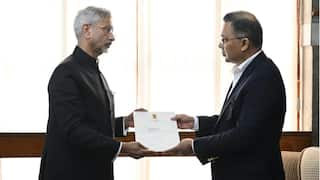Pakistan: Unprecedented Presser By Army, ISI Hints At Elements Behind Journalist Murder, Dismisses Imran Khan Claims
This is the first time in Pakistan's history that an ISI head directly spoke to media. ISPR and ISI chiefs pointed to 'role' played by Imran Khan and the employer of the journalist killed in Kenya.

Islamabad: In an unprecedented joint press conference Thursday, Director General of Inter-Services Public Relations (DGISPR) Lt Gen Babar Iftikhar and Director General of Inter-Services Intelligence (DGISI) Lt Gen Nadeem Ahmed Anjum spoke about the murder of senior journalist Arshad Sharif in Kenya, and made some explosive claims, on a day his last rituals were being conducted.
This is the first time in the history of Pakistan that an ISI head directly spoke to the media.
The two officers sought to demolish former prime minister Imran Khan’s narrative of a conspiracy that the latter had claimed led to regime change in the country, and hinted at the role of Khan, a leading news channel’s owner Salman Iqbal and other elements that they said led to the killing of the journalist.
Arshad Sharif Murder:
Arshad Sharif was brutally killed in a shooting by the police in the Kenyan capital of Nairobi on the night of Sunday, October 23. It was reportedly a case of mistaken identity, according to the Kenya Police.
The murder and the circumstances that led to it have since dominated the media discourse.
Addressing the media Thursday, DGISPR Iftikhar said they came face to face with the reporters for the purpose of “presenting facts”.
“This press conference is being held in the context of presenting facts so that facts, fiction and opinion can be differentiated. Prime Minister Shehbaz Sharif has been specifically informed about the sensitivity of the press conference.”
The DG said Arshad was among many journalists who were fed with a “propaganda-based narrative built by Imran Khan” in the wake of the ‘cypher’, which allegedly led to the regime change conspiracy in the country.
'Cypher' became a keyword in Pakistan politics after Imran Khan made claims about a conspiracy to oust him. The controversy only escalated after recent audio leaks of several political leaders, including Khan. Cypher refers to coded and restricted diplomatic communication with specific numbers and dates assigned to them.
Seaking to the media, the DG of ISPR said Arshad’s employer and prominent news channel ARY News played the role of a spin doctor to target the army, adding that its CEO Salman Iqbal should be brought back to Pakistan and investigated.
Speaking about the alleged threat letter and alert shared by the Khyber Pakhtunkhwa (KP) government with Arshad, he said it was fake, claiming intelligence agencies had no information of any such threat to the journalist.
“The threat letter by the Khyber Pakhtunkhwa government was issued as part of the plan to create grounds to compel Arshad to leave Pakistan. Arshad did not want to leave Pakistan.”
The DGI added: “ARY CEO Salman Iqbal then asked for immediate arrangements for Arshad Sharif’s exit from Pakistan and he was given KP government’s protocol to fly from the Peshawar airport. His airplane ticket was also booked and paid by ARY digital.”
Both the DG of ISPR and the ISI head said no one forced Arshad to leave Pakistan or even Dubai, and that he did not face any threat in Pakistan.
This is in contrast to the recent claim made by Imran Khan that he was the one who had asked Arshad to leave Pakistan after he was informed of imminent threats by TTP (Tehreek-e-Taliban Pakistan) splinter groups, who, as per the threat letter, wanted to kill him.
It is also important to note that while Arshad had been in Kenya since September, he was in contact or staying with two persons — Khurram Ahmed and Waqar Ahmed. It was reported that Khurram Ahmed was driving the vehicle that faced Kenyan police bullets. While two bullets hit Arshad in his head and back, Khurram remained unharmed. The first call that he made after Arshad was shot dead was to ARY CEO Salman Iqbal, and not to his family. The farmhouse that Arshad was going to in Kenya was also owned by Salman Iqbal, which has raised questions over the contacts and connections related to the killing.
Lt Gen Iftikhar and Lt Gen Anjum emphasised that a thorough investigation should be launched, and even if a UN body, or an international independent body is to be involved, it should be done on priority.
ISI, ISPR Dismiss Imran Khan’s Narrative:
Rubbishing Imran Khan’s claims and the narrative that his government was ousted through a conspiracy, revealed through the cypher and implemented by his opposition political parties along with the military establishment, Lt Gen Iftikhar said the reality of the cypher and the March 27 narrative built through it were “far from reality”.
He said intelligence agencies and the military had already made it abundantly clear that there was no proof of a conspiracy in the cypher, and it was conveyed to the government clearly during the National Security Council (NSC) meeting. However, he added, a different narrative was built in the name of regime change, with journalists and social media influencers becoming its propaganda tools.
Lt Gen Anjum said he was compelled to become part of the joint press conference as “lies continued to be spread and kept repeating themselves, which were being accepted by the majority of the youth of the country”. “I also came today because opting to silence for long is also not the right option when lies are becoming more vocal,” he added.
“Besides, it is necessary to determine the factors due to which a particular narrative is being built and people are being misled.”
Lt Gen Anjum said Chief of Army Staff General Qamar Jawed Bajwa was also targeted and faced criticism. “And an attempt was made to create a divide in society.”
Recalling Imran Khan’s March 27 public rally in Islamabad, Lt Gen Iftikhar said: "It was surprising for us when on March 27 a piece of paper was waved and an attempt was made to build a narrative that was far from reality. Several facts had come to light regarding the cypher revealing the baseless and unfounded narrative surrounding it.”
He added: “Army was expected to intervene in domestic politics. The word neutral and apolitical was turned into an abuse. To all this baseless narrative, the army chief and the institution showed restraint and we tried our best that politicians sit together to resolve their issues.”
Lt Gen Anjum said the nation had given him the responsibility to take secrets to the grave. “But when needed and when necessary, I will bring those facts to light.”
He added: “Last year, the establishment decided that it would restrict itself to its constitutional role […] The army had an intense discussion and we reached the conclusion that the country’s benefit lies in us restricting ourselves to our constitutional role and remaining out of politics.”
The ISI chief said there was “a lot of pressure” in March but the institution and the army chief decided to limit the military to its constitutional role.
He also slammed Imran Khan for openly targeting the military establishment during the day while meeting the same institutions at nights with a wish list of things he intended to see done to bring him back into power.
“You (Imran Khan) meet quietly at night through the back door and express your unconstitutional wishes but call the army chief a traitor in broad daylight. That’s a big contradiction between your words and your actions,” the ISI chief said.
He also said Imran Khan had offered Gen Bajwa an unlimited extension in office during March, when the opposition parties were ganging up to oust him from power.
“The offer was made because the no-confidence motion was at its peak.”
The explosive press conference has opened up a new Pandora’s Box that could deal a massive blow to Imran’s upcoming long march, besides his narrative of regime change controversy and his anti-establishment position. In addition, the two officers directly hinted at Imran Khan and his KP government’s involvement in the murder of journalist Arshad Sharif, which could have an impact on his public support.
Related Video
Breaking News: Delivery Crisis Today, Zomato, Swiggy, and Other Platforms Face Worker Strike





































